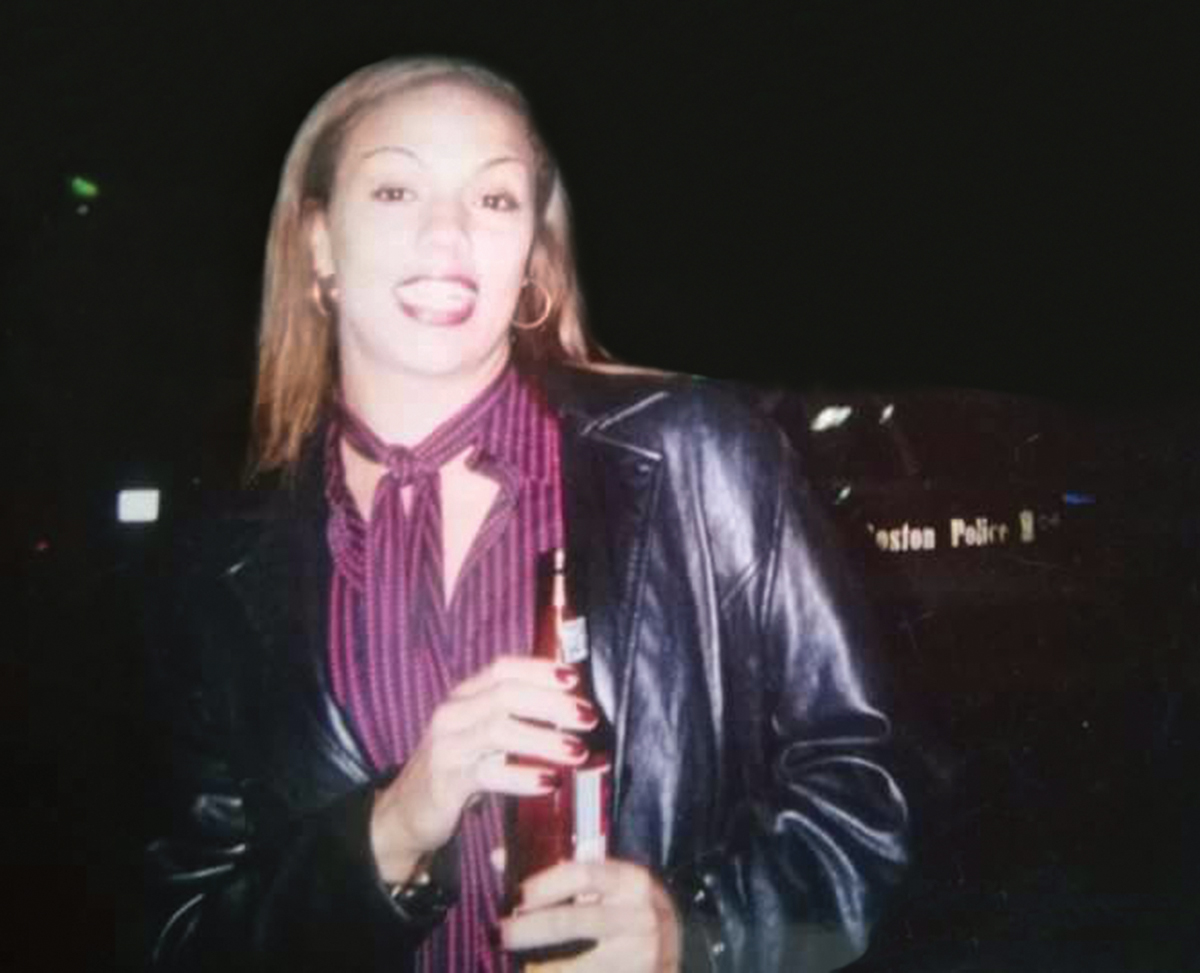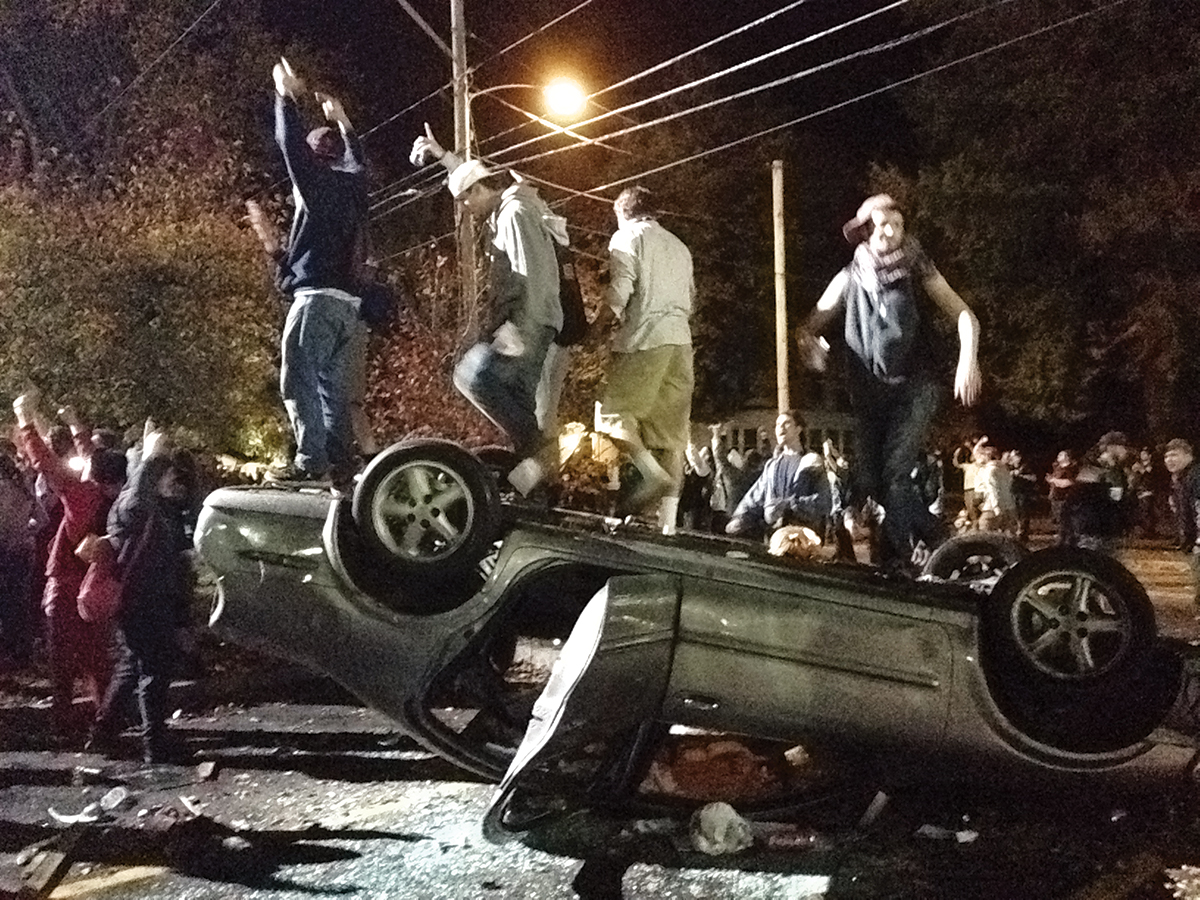Coddled, Not Stirred

The author in her twenties responsibly enjoying a beverage in front of one of Boston’s finest.
I had my first bottle of beer when I was 12. It was St. Patrick’s Day, the day my friend Donna and I decided would be easiest to sneak beers away from our parents’ plentiful stocks. We chose beer even though I hated it whenever I stole sips from adults’ glasses. Intoxication wasn’t the goal. Instead, we wanted to do something taboo, mimic the adult rituals we saw around us.
Drinking in Southie was as ingrained in our culture as St. Patrick’s Day and Catholicism (even the priests drank), so I’d already received plenty of schooling. Adults imbibed openly without a shred of shame. I saw how some adults could stop at one or two, and how others couldn’t and would go on to ruin a Christmas party. I saw sloppy women waving cigarettes that had long since gone out, yelling obnoxiously, and I saw classy, well-dressed women drinking champagne and dancing at weddings and family parties. I saw all of the ways people used, abused, abstained from, clung to, ran from, and enjoyed alcohol.
In those days, adults didn’t sweat all the “dos and don’ts” du jour of child rearing. Our parents smoked, cursed, and drank in front of us, in the authoritative parenting style of the time: Do what I say and not what I do. Yes, they wanted us to be happy and healthy, but mostly, it seemed our parents wanted our compliance, not our approval.
Though our parents didn’t outright encourage drinking—and usually tried to prevent it—they knew that we were going to do it anyway, and they knew that our older brothers, sisters, neighbors, and friends would make sure we got home safe and didn’t get into too much trouble. They’d slap our wrists, make us breakfast, and laugh among themselves that their kids were doing exactly what they did as kids.
We had “runners” (a nod to Prohibition-era rum runners) and developed elaborate ways to hide our booze from the police, including, but not limited to, a pulley system that, at the first sign of cops, could lift our cases of beer out of sight and into a tree; a built-in ground cooler using the sewers, trash bags, ice, and a crow bar; and, of course, the simple hole in the ground covered with patches of grass. We called in liquor deliveries (an amenity now seen as progressive by millennials). When the delivery showed up—five cases of Bud Light, two cases of California wine coolers, two packs of Dentyne, and three packs of Newports—the delivery man, usually an older kid we knew, barely batted a skeptical eye when the oldest-looking among us answered the door, cash in hand, saying, “Oh, my mother is in the shower, here you go” before handing him a $10 tip. He’d drop the stash, count the cash, and tell us to be careful.
Every corner, park, and basketball court was crawling with drinking teenagers, which now makes me feel like I owe Mrs. Wallace, who lived across the street from M Street Park, a sincere apology for the noise. Please consider this your official apology. Still, we were mostly very respectful. This was our neighborhood; these were our uncles, cousins, friends, and neighbors.
The cops didn’t bother us that much, but when they did, it seemed more like a playful game of “catch me if you can.” They’d cart their spoils (our booze) to their trunks and brag about how much they were going to enjoy our wine coolers and beers. On rare occasions some fool would mouth off and get “pc’d” (placed in police protective custody for 24 hours, or until you sobered up), as we called it, but the cops weren’t looking to ruin the lives of these kids. Having once been on the same streets themselves, they just wanted to control it.
Our friends’ mothers would smack us for infractions as they saw fit. If I went home and said, “Ma, Mrs. So-and-So yelled at me” or “Ma, Mrs. So-and-So hit me,” it was usually met with a statement like, “You probably deserved it,” or a question: “Well, what did you do?” We nursed glass-shattering hangovers at friends’ houses as their dads scolded us while making fun of how bad we felt and cooking us bacon and eggs. The scolding would then morph into war stories of their own teen drinking days with our mothers and fathers.
Youth and alcohol are a deadly combination, especially when you add in strange environments and a weak connection to the people you’re drinking with. People did get hurt—fights erupted and sometimes things escalated. Learning how to imbibe is a dangerous sport. But we were protected by our community. Our deep-rooted connections meant we watched out for one another, and we never abandoned a drunken friend. You’d be in more trouble for leaving someone behind than for hitting the bottle.

In 2014, students at Keene State College overturned a car after a party got out of control. / Photo by Jeremy Fox/The Boston Globe via Getty Images
By the time I reached legal drinking age, boozing wasn’t such a big deal to me. My friends and I still met regularly at the Abbey, Deeney O’Malley’s, or the Bayside Club, but because we knew how to handle our booze, we posed less of a risk to the establishment—and to ourselves. At the beginning of the night, everyone coughed up $20 or $40 for the table; we almost never spent all that money, usually leaving a third for our server. We’d wait in the cab while dropping off friends to ensure they got inside safely. Following the “No man left behind” credo, we never let anyone leave alone, and we were never around strangers. There was plenty of social pressure to handle our liquor—after all, no one wanted to deal with a slob.
I remember Carol, the faithful cocktail waitress at Deeney’s (now the Junction), making a toast to my friend: “Happy 21st birthday to my best customer!” We all laughed at the irony.
I certainly had my fair share of fuzzy nights, embarrassing moments, and crushing hangovers, but drinking became just another thing I did. By the time I hit college, my focus was on being the first in my family to graduate and get a good job so I could buy a house and have a career and a decent life. Which is exactly what I did.
I’m not saying that I’ve figured it out, nor am I advocating that everyone drink, but my real-world experience taught me that if I was going to drink, I had to learn to be better at it. I was lucky to be able to make rookie drinking mistakes without major consequences, surrounded by lifelong friends and people who cared about me.
We hate the idea of our children doing adult things, but we know that burying our heads in the sand is as dangerous as it is ineffective. We know that information empowers kids to become thoughtful decision-makers. We teach them to drive a car, have sex responsibly, and eat healthfully. We teach them to make good choices. Why is it that when it comes to substance abuse, we go silent?
Maybe we trust that because it’s illegal, drinking won’t happen in college, or the booze will be so tough to get that it won’t play a big role in campus life. Then again, we’ve seen how prohibition has the opposite effect. Our ill-advised alcohol laws turn every kid into a criminal, and leave us powerless to coach them through it because…they’re not supposed to be drinking.
Instead, we should take a cue from Southie and help our teens transition from inexperienced, covert binge drinkers into informed, educated, and responsible imbibers before they hit campus. That entails being honest with them. When we deny that we’ve been blackout drunk, driven when we’ve had too much, or hooked up with someone we wish we hadn’t, we’re denying them the wisdom of our experience. And that’s pure negligence.
PLUS:
A Few Southie Tips for Handling Your Liquor


